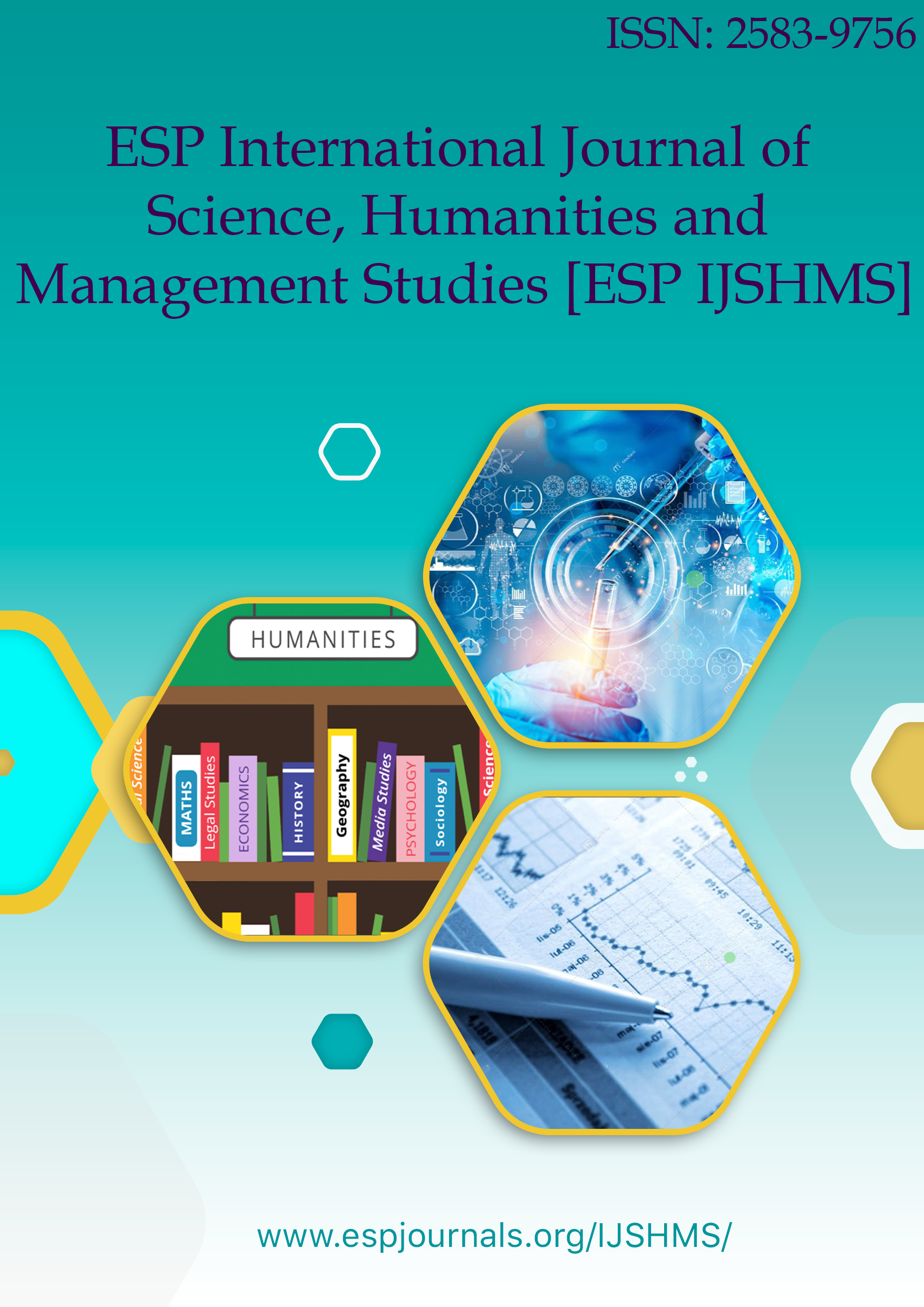ESP International Journal of Science, Humanities & Management Studies(ESP-IJSHMS)
Citation :
Ruksar Sultana, 2025. "Philosophical Approaches to Emotional Regulation: A Multidisciplinary Exploration" ESP International Journal of Science, Humanities & Management Studies(ESP-IJSHMS) Volume 3, Issue 2: 79-82.
Abstract :
Emotional regulation is a critical aspect of human psychology that involves the ability to manage and adjust emotions to adapt to life's challenges. This topic has been extensively studied across philosophy, psychology, and neuroscience. Philosophical traditions provide deep insights into managing emotions by emphasizing ethics, reason, and self-awareness as tools for navigating emotional experiences. This article investigates the philosophical foundations of emotional regulation by examining key concepts from Stoicism, Buddhism, and existentialism. Stoicism advocates for rational control of emotions, Buddhism focuses on mindfulness and detachment, and existentialism emphasizes authenticity in emotional experiences. These philosophical perspectives are compared and integrated with contemporary scientific understandings of emotional regulation, drawing from psychological and neuroscientific research. The article also examines the challenges and opportunities in combining philosophical and empirical approaches, particularly in addressing emotional regulation in today's fast-paced, interconnected world. By bridging classical philosophies with modern theories, this research provides a comprehensive understanding of how emotional regulation contributes to well-being and resilience. A detailed review of references underscores the lasting relevance of philosophy in addressing emotional regulation and offers practical strategies for cultivating emotional balance and adaptability in an increasingly complex and rapidly changing environment.
References :
[1] Aristotle, *Nicomachean Ethics* (J. Sachs, Trans.), Focus Publishing, 2004.
[2] M. Aurelius, *Meditations* (M. Hammond, Trans.), Penguin Classics, 2006.
[3] S. Ahmed, *The Promise of Happiness*, Duke University Press, 2010.
[4] S. Ahmed, *The Cultural Politics of Emotion*, Routledge, 2004.
[5] A. R. Hochschild, *The Managed Heart: Commercialization of Human Feeling*, Univ. of California Press, 2012.
[6] P. Ha dot, *Philosophy as a Way of Life*, Blackwell, 1995.
[7] W. B. Irvine, *A Guide to the Good Life: The Ancient Art of Stoic Joy*, Oxford Univ. Press, 2009.
[8] J. Kabat-Zinn, "Mindfulness-based interventions in context," *Clin. Psychol.: Sci. Pract.*, vol. 10, no. 2, pp. 144-156, 2003.
[9] M. C. Nussbaum, *Upheavals of Thought: The Intelligence of Emotions*, Cambridge Univ. Press, 2001.
[10] K. Kristjánsson, *Aristotle, Emotions, and Education*, Routledge, 2015.
[11] P. Goldie, *The Emotions: A Philosophical Exploration*, Oxford Univ. Press, 2000.
[12] J. J. Gross, "Emotion regulation: Conceptual and empirical foundations," *Handb. Emotion Reg.*, vol. 2, pp. 3-20, 2015.
[13] A. Damasio, *Descartes’ Error: Emotion, Reason, and the Human Brain*, Putnam, 1994.
[14] R. C. Roberts, *Emotions: An Essay in Aid of Moral Psychology*, Cambridge Univ. Press, 2003.
[15] R. C. Solomon, *The Passions: Emotions and the Meaning of Life*, Hackett, 1993.
[16] P. Ekman, "An argument for basic emotions," *Cogn. Emotion*, vol. 6, no. 3-4, pp. 169-200, 1992.
[17] M. Merleau-Ponty, *Phenomenology of Perception* (C. Smith, Trans.), Routledge, 1962.
[18] E. Husserl, *Ideas Pertaining to a Pure Phenomenology and to a Phenomenological Philosophy*, Springer, 1982.
[19] S. Kierkegaard, *The Concept of Anxiety*, Princeton Univ. Press, 1980.
[20] J.-P. Sartre, *Being and Nothingness*, Washington Square Press, 1992.
[21] Seneca, *Letters from a Stoic*, Penguin Classics, 2008.
[22] B. A. Wallace, *Buddhism and Science: Breaking New Ground*, Columbia Univ. Press, 2001.
[23] R. J. Davidson and S. Begley, *The Emotional Life of Your Brain*, Penguin, 2012.
[24] J. Kabat-Zinn, *Full Catastrophe Living*, Delacorte Press, 1990.
[25] F. J. Varela, E. Thompson, and E. Rosch, *The Embodied Mind*, MIT Press, 1991.
[26] S. Blackburn, *Ruling Passions: A Theory of Practical Reasoning*, Oxford Univ. Press, 1998.
[27] S. Harris, *Waking Up: A Guide to Spirituality Without Religion*, Simon & Schuster, 2014.
[28] K. D. Neff, "Self-compassion: An alternative conceptualization of a healthy attitude toward oneself," *Self Identity*, vol. 2, no. 2, pp. 85-101, 2003.
[29] C. Taylor, *Sources of the Self: The Making of the Modern Identity*, Harvard Univ. Press, 1989.
[30] Thich Nhat Hanh, *The Heart of the Buddha’s Teaching*, Broadway Books, 1998.
Keywords :
Emotional Regulation, Mindfulness, Resilience, Neuroscience.


 : 10.56472/25849756/IJSHMS-V3I2P108
: 10.56472/25849756/IJSHMS-V3I2P108